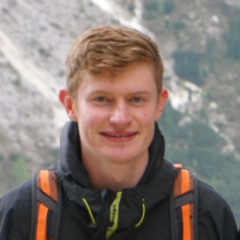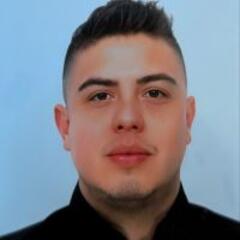Visitors

Stephen O'Neill received his integrated MEng in chemical engineering from the University of Edinburgh in 2020. He undertook his MEng thesis project at Stanford University, which involved the development and integration of organic electronic materials for the wireless operation of biomedical devices. As a PhD student, Stephen is working on developing electrically conductive hydrogel materials for bioelectronic applications, in a collaboration with Prof. Oren Scherman in the Department of Chemistry.

Viviana Rincón Montes received her BSc. in Electronics and Computer Engineering (2013) with honours from the Instituto Tecnológico y de Estudios Superiores de Monterrey (Mexico). She received her MSc. in Biomedical Engineering in 2016 and in 2021 she received her PhD in Engineering (Dr.-Ing.) with Summa Cum Laude recognition from the RWTH Aachen University and the Institute of Bioelectronics (IBI-3) at Forschungszentrum Jülich (Germany). From October 2020 she continued as a postdoctoral researcher, and since October 2021 she has been a Junior Group Leader of the ‘In vivo Neuroelectronics’ group at IBI-3 and an Associated Scientist of the InnoRet Vision Research Training Group (RTG) 2610 in Germany. Her research interests comprise the development of implantable stealth neurotechnology to understand and restore lost neural functions in the body, with applications including vision restoration and pain. Currently, she is a Visiting Research Fellow at the Bioelectronics Laboratory, focusing on the development of implantable biohybrid neurotechnologies for the central nervous system.

Andrea Cid Alonso received her Bachelor's degree in Chemistry from the University of the Basque Country (UPV/EHU) in San Sebastian, in 2020-2024. Now, she is a Master student specialising in "Chemistry and Polymers" in the institution POLYMAT in the University of the Basque Country, under the supervision of Prof. David Mecerreyes. She is currently doing research as a visitor student at the Bioelectronics Laboratory in the Engineering Department at the University of Cambridge, with Prof. George Malliaras as supervisor. The research project is focused on improving the chemical adhesion of polymeric materials made of PEDOT:PSS for applications in wearable or implantable devices.

Hessa Alfalahi is a postdoctoral fellow with the department of biomedical engineering and biotechnology at Khalifa University of Science and Technology, Abu Dhabi, United Arab Emirates (UAE) and a visiting research scholar at the University of Cambridge. She obtained the B.Sc., M.Sc. and Ph.D. degree in biomedical engineering from Khalifa University in 2018, 2020 and 2024, respectively. During her M.Sc., Hessa worked on soft robotic catheters for minimally invasive cardiac surgery. Besides, in her Ph.D., she worked on advanced bio-inspired signal processing methods for biomedical data analysis and clinical translation of diagnostic wearable technology from bench to bedside. Hessa was the recipient of the L’Oreal UNESCO For Women in Science Middle East Regional award in 2022 and the Innovators Under 35 award in 2023, for her research on early detection of depression and Parkinson’s disease using smartphone data collected in-the-wild. Her research interests include biomedical signal processing, machine learning and mathematical modeling of physiological processes. She recently joined the bioelectronics lab at the University of Cambridge whereby she aims to develop a unified data analysis pipeline for signals extracted by implantable and wearable bioelectronics, with a focus on spinal cord signals.

Juan David Cortés Ossa is a PhD student in Materials Science at the University of Alicante, conducting his research at BCMaterials (Basque Center for Materials, Applications and Nanostructures) in Spain. He holds a Bachelor's degree in Engineering Physics from Universidad Tecnológica de Pereira (Colombia) and a Master’s degree in Nanophysics and Advanced Materials from Universidad Complutense de Madrid (Spain). His research focuses on the development and electrical characterization of biomaterials for bioelectronics, particularly self-assembled peptide nanofibers, engineered protein films, and hybrids of these materials with conductive polymers like PEDOT. He also evaluates their performance under different environmental conditions to understand their stability and functional behaviour in solid-state devices. At Cambridge, Juan investigates degradation mechanisms in PEDOT:PSS-based devices, with the aim of improving long-term operational stability and exploring the potential of biomaterials in robust device architectures.
